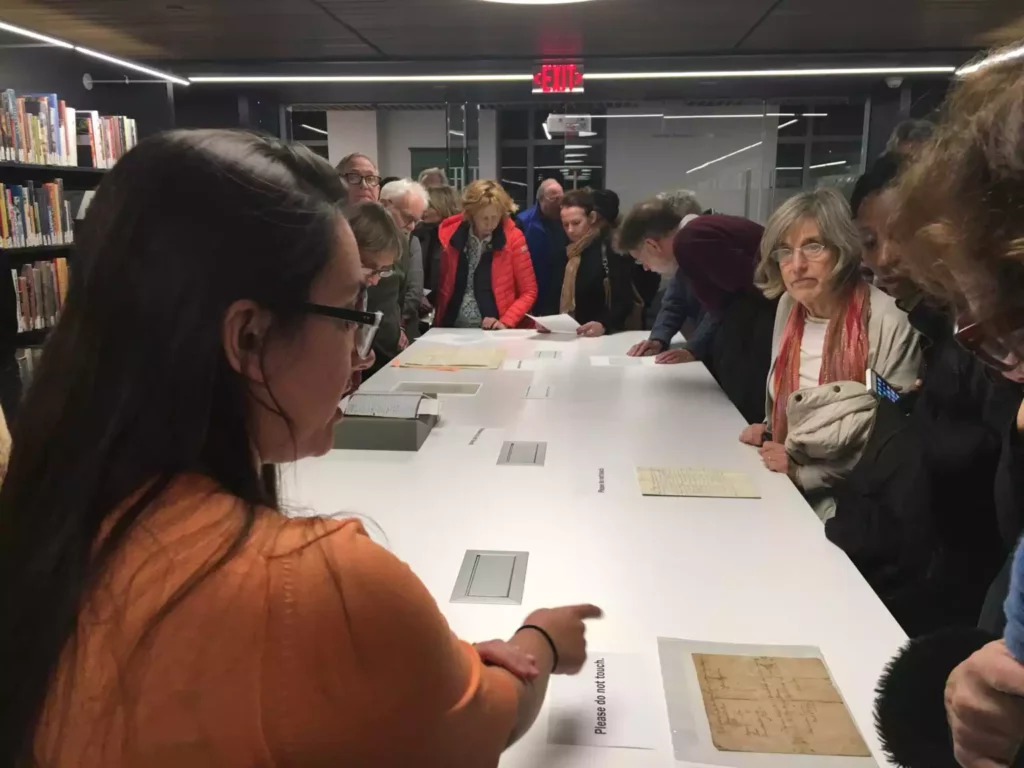
To extend our community outreach, the library partners with the many municipal, non-profit, and business organizations that make Princeton such an extraordinary town. This month, the Historical Society of Princeton (HSP) is in the spotlight.
The library and the Historical Society of Princeton collaborate on programs and projects designed to enrich the lives of our community members by furthering an understanding of local history. Our collaborations include Open Archive programs that allow visitors to view seldom-seen HSP collections, the Voices of Princeton oral history project that collects and shares stories of Princetonians, local history exhibits in the Princeton Room and more. We have also worked with the historical society and local historian Shirley Satterfield to highlight African-American history in Princeton.
The HSP’s museum is currently closed due to Covid-19, but a number of history-related activities can be accessed at History @ Home.
Recently, we spoke with Historical Society of Princeton Executive Director Izzy Kasdin.
How long has the Historical Society of Princeton been in Princeton?
We were founded in 1938.
What is your primary area of focus?
Our primary area of focus is history education, which we deliver through four Signature Programs: stewardship of a vast historical collection, providing salient interactions with the past; exhibitions on a variety of local historical topics, both on-site at our headquarters and off-site throughout town; public programs for children and adults, such as lectures, book groups, workshops, and hands-on events; and co-curricular support, grounded in primary sources, for K-12 schools.
Why do you like partnering with the library?
We love partnering with the library because of our shared values around the importance of the public humanities. At HSP, we firmly believe that the humanities strengthen our diverse society, and we know this view is shared by the library. We appreciate the library’s emphasis on gathering the community for respectful conversation. All of the staff at the library are phenomenal community partners to work with – supportive, communicative and enthusiastic. We’re so proud of what we’ve been able to achieve in meaningful historical programming with our partners at the library.
With whom do you work most in the community?
Probably the library! In addition to co-presenting over a dozen public programs and events last year, we also continue to work with the library on our ongoing Voices of Princeton oral history collecting project. We’ve worked together with the Princeton University Library on digitizing local historical newspapers, and every year we launch a panel exhibition about a Princeton history topic in the Princeton Room. But we love collaborating with so many of Princeton’s wonderful cultural and educational institutions, and also work with Morven Museum and Garden, the Arts Council of Princeton, the Princeton Battlefield Society and the Marquand Park Foundation, among others.
What is something that you do that people might not know about?
We find that people are not always aware of the vastness of the historical collection we hold, and all of the ways we use it in the community. Often at our Open Archive programs with the library, attendees are surprised to see the breadth and depth of materials in our collection. We do have the largest collection of Albert Einstein’s personal belongings in the world, and we’re known for that, but we also have over 800 manuscript collections of letters, maps, and architectural drawings, 500 oral history recordings, nearly 30,000 historic photographs, over 2,000 artifacts, and over 1,200 research subject files, representative of a truly diverse range of Princeton stories. When we reopen, anyone can conduct research in and access that collection. We want the community to know that it’s their history, and, with their help, we’re adding to it every day.
Additionally, people who don’t have kids in school might not know about the deep partnership we have with schools in our community. We recently redeveloped Princeton Public Schools’ third grade local history curriculum to include a fuller picture of Princeton’s history, including its history of school segregation, immigration, and discrimination, all using primary historical materials to familiarize students with the historical process and “how we know” about the past. This has been a really rewarding and educational process for us, and one that we’ve been focused on effectively virtualizing for remote learning.
Is there any project or event that you are particularly excited about at the moment?
We’re really excited about this “virtual tour”/interactive map that we created to align with the release of the filmed version of the musical, Hamilton. It was so interesting for us to research the musical’s connections to our historic town, and to be able to ground people’s experiences of the blockbuster hit in some places they know very well. We love when we can connect Princeton’s rich history with events that are the forefront of people’s minds today.
Photo Credit: Izzy Kasdin
Written with Hannah Schmidl, public humanities coordinator at Princeton Public Library
